Unit One Festivals around the world
人教版高中英语必修3 unit 1 Festivals around the world课件

常考时态的基本用法:
一般现在时 How is your daily life as a high school student?
(3 sentences or more,使用实意动词和系动词, 注意动词形式变化)
一般现在时
I study hard every day and I get along well with my classmates, but sometimes I miss my families.
English Basic Tenses (时态)
为什么英语中有时态之说?
他昨天来了. He came yesterday. 他已经来了. He has come. 他明天来. He will come tomorrow.
汉语借助词汇手段而非词的形态变化来表示 动作的发生, 而英语主要通过谓语动词时态变化来表现. 任何句子都要先注意时态.
,
He had worked. 过去完成时 He has been working. 现在完成进行时
要 牢 记
高考不常考的时态,可选择理解:
He will be working. 将来进行时 He would be working. 过去将来进行时 He will have worked. 将来完成时 He would have worked.过去将来完成时 He had been working. 过去完成进行时 He will have been working. 将来完成进行时 He would have been working. 过去将来完成进
一般现在时 ( The Present Indefinite )
1.结构: 主语为第三人称单数时,谓动要变化,
其余人称用原形.
高中英语必修三unit1festival around the world warming and reading festivals and celebrations课件

……
Words about Spring Festival
Greeting Season
春节 The Spring Festival 农历 lunar calendar 除夕 New Year's Eve; eve of lunar New Year 初一 the beginning of New Year 元宵节 the Lantern Festival
Kinds of Festivals
Festivals of the Dead
Festivals to Honour People
Harvest Festivals
Spring Festivals
When did ancient people celebrate? Most ancient festivals would celebrate the end of______________, the cold weather ________________and planting in spring ____________________. Other celebrations harvest in autumn when hunters had caught animals were held _______________________________.
Teachers’ Day
Teacher’s Day is a day when we show respect to our teachers.
Festivals
Unit-1-Festivals-around-the-world-课文知识点解析1
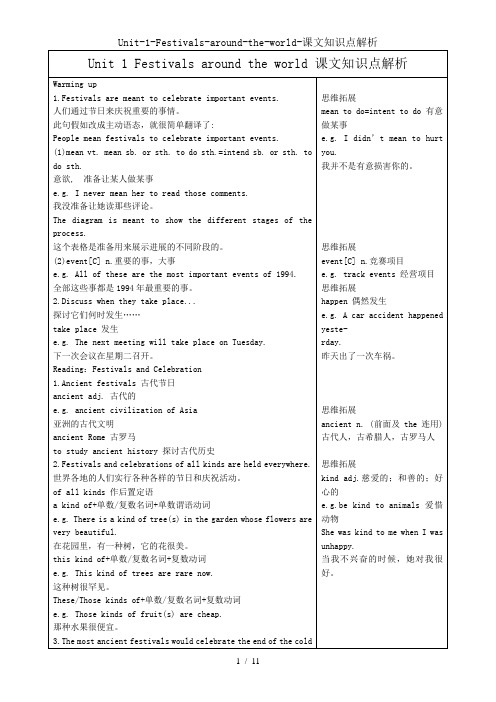
7....when people should go to clean the graves and light incense in memory of their ancestors.
……这时候,人们去扫墓,点上香火祭祀祖先。
memory[ C usually plura] n. 表示所记住的事情,记忆
starve vt.&vi. 挨饿,饿死
e.g. Thousands of people will starve if food doesn’t reach the stricken city.
假如食物无法到达这座受灾的城市,成千上万的人将会饿死。
5.They lit fire and made music because they thought these festivals would bring a year of plenty.
他们把食物, 鲜花和礼物献给死者。
offer sth. to sb.= offer sb.sth.供应某物给某人
e.g. He offered me 300 dollars for that television.
他出300美元向我买那部电视机。
12.The festival of Halloween had its origin as an event in memory of the dead.
万圣节起源于纪念已逝的人们。
had its origin as an event 起源于某事
have your or its origin=begin 开始
e.g.Many of the problems had their origin in post-war Europe.
人教版高中英语必修三Unit1Festivalsaroundtheworld
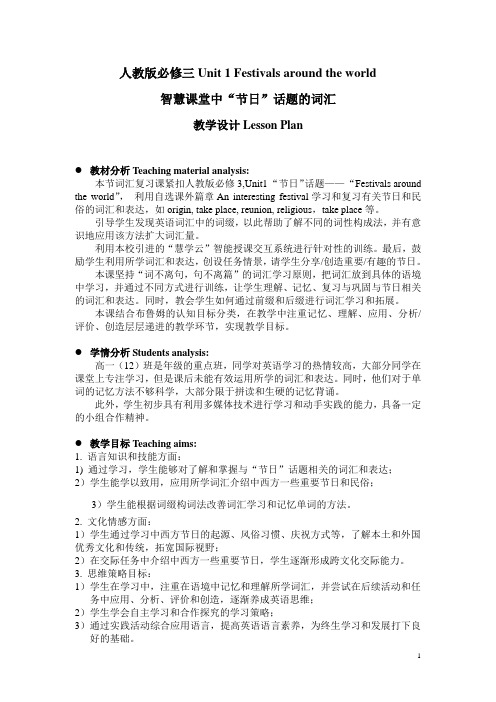
人教版必修三Unit 1 Festivals around the world智慧课堂中“节日”话题的词汇教学设计Lesson Plan●教材分析Teaching material analysis:本节词汇复习课紧扣人教版必修3,Unit1 “节日”话题——“Festivals around the world”,利用自选课外篇章An interesting festival学习和复习有关节日和民俗的词汇和表达,如origin, take place, reunion, religious,take place等。
引导学生发现英语词汇中的词缀,以此帮助了解不同的词性构成法,并有意识地应用该方法扩大词汇量。
利用本校引进的“慧学云”智能授课交互系统进行针对性的训练。
最后,鼓励学生利用所学词汇和表达,创设任务情景,请学生分享/创造重要/有趣的节日。
本课坚持“词不离句,句不离篇”的词汇学习原则,把词汇放到具体的语境中学习,并通过不同方式进行训练,让学生理解、记忆、复习与巩固与节日相关的词汇和表达。
同时,教会学生如何通过前缀和后缀进行词汇学习和拓展。
本课结合布鲁姆的认知目标分类,在教学中注重记忆、理解、应用、分析/评价、创造层层递进的教学环节,实现教学目标。
●学情分析Students analysis:高一(12)班是年级的重点班,同学对英语学习的热情较高,大部分同学在课堂上专注学习,但是课后未能有效运用所学的词汇和表达。
同时,他们对于单词的记忆方法不够科学,大部分限于拼读和生硬的记忆背诵。
此外,学生初步具有利用多媒体技术进行学习和动手实践的能力,具备一定的小组合作精神。
●教学目标Teaching aims:1. 语言知识和技能方面:1) 通过学习,学生能够对了解和掌握与“节日”话题相关的词汇和表达;2)学生能学以致用,应用所学词汇介绍中西方一些重要节日和民俗;3)学生能根据词缀构词法改善词汇学习和记忆单词的方法。
新人教版 Book 3 Unit 1 Festivals around the world 课文

Unit 1 Festivals around the worldPart I Festival s and celebration sFestival s and celebration s of all kinds have been held everywhere since ancient times. Most ancient festivals would celebrate the end of the cold weather, plant ing in spring and harvest in autumn. Sometimes celebrations would be held after hunter s had caught animals. At that time people would starve if food was difficult to find, especially during the cold winter months. Today’s festivals have many origin s, some religious, some season al, and some for special people or event s. Festivals of the DeadSome festivals are held to honour the dead, or to satisfy the ancestor s, who might return either to help or to do harm. For the Japanese festival Obon, people should go to clean the grave s and light incense in memory of their ancestors. They also light lamp s and play music because they think that this will lead the ancestors back to earth. In Mexico people celebrate the Day of the Dead in early November. On this important feast day, people eat food in the shape of skulls and cakes with “bone s” on them. They offer food, flowers and gift s to the dead. The western holiday Halloween also had its origin in old belief s about the return of the spirit s of dead people. It is now a children’s festival, when they can dress up and go to their neighbours’ homes to ask for sweets. If the neighbours don’t give any sweets, the children might play a trick on them.Festivals to Honour PeopleFestivals can also be held to honour famous people. The Dragon Boat Festival in China honours the famous ancient poet, Qu Yuan. In the USA, Columbus Day is in memory of the arrival of Christopher Columbus in the New World. India has a national festival on October 2 to honour Mahatma Gandhi, the leader who helped gain India’s independence from Britain.Harvest FestivalsHarvest and Thanksgiving festivals can be very happy events. People are grateful because their food is gather ed for the winter and the agricultural work is over. In European countries, people will usually decorate church es and town hall s with flowers and fruit, and will get together to have meals. Some people might win award s for their farm produce, like the biggest watermelon or the most handsome rooster. China and Japan have mid-autumn festivals, when people admire the moon and in China, enjoy mooncakes.Spring FestivalsThe most energetic and important festivals are the ones that look forward to the end of winterand to the coming of spring. At the Spring Festival in China, people eat dumplings, fish and meat, and may give children lucky money in red paper. There are dragon dances and carnival s, and families celebrate the lunar New Year together. Some Western countries have very exciting carnivals, which take place forty days before Easter, usually in February. They might include parades, dancing in the streets day and night, loud music and colourful clothing of all kinds. Easter is an important religious and social festival for Christians around the world. It celebrates the return of Jesus from the dead and the coming of spring and new life. Japan’s Cherry Blossom Festival happens a little later. The country, covered with cherry tree flowers, looks as though it is covered with pink snow.People love to get together to eat, drink and have fun with each other. Festivals let us enjoy life, be proud of our custom s and forget our work for a little while.Part II a sad love storyLi Fang was heart-broken. It was Valentine’s Day and Hu Jin had said she would meet him at the coffee shop after work. But she didn’t turn up. She could be with her friends right now laughing at him. She said she would be there at seven o’clock, and he thought she would keep her word. He had looked forward to meeting her all day, and now he was alone with his roses and chocolates, like a fool. Well, he was not going to hold his breath for her to apologize. He would drown his sad ness in coffee.It was obvious that the manager of the coffee shop was waiting for Li Fang to leave —he wipe d the tables, then sat down and turned on the TV —just what Li Fang needed! A sad Chinese story about lost love.The granddaughter of the Goddess of Heaven visited the earth. Her name was Zhinu, the weaving girl. While she was on earth she met the herd boy Niulang and they fell in love. (“Just like me and Hu Jin,” thought Li Fang.) They got married secretly, and they were very happy. (“We could be like that, ” thought Li Fang.) When the Goddess of Heaven knew that her granddaughter was married to a human, she became very angry and made the weaving girl return to Heaven. Niulang tried to follow her, but the river of stars, the Milky Way, stop ped him. Finding that Zhinu was heart-broken, her grandmother finally decided to let the couple cross the Milky Way to meet once a year. Magpies make a bridge of their wing s so the couple can cross the river to meet on the seventh lunar month. People in China hope that the weather will be fine on that day, because if it is raining, it mean s that Zhinu is weep ing and the couple won’t be able to meet.The announcer said, “This is the story of Qiqiao Festival. When foreigner s hear about the story, they call it a Chinese Valentine’s story. It’s a fine day today, so I hope you can all meet the one you love.’’As Li Fang set off for home, he thought, “I guess Hu Jin doesn’t love me. I’ll just throw these flowers and chocolates away. I don’t want them to remind me of her.’’ So he did.As he sadly pass ed the tea shop on the corner on his way home, he heard a voice calling him. There was Hu Jin waving at him and calling, “Why are you so late? I’ve been waiting for you for a long time! And I have a gift for you!”What would he do? He had thrown away her Valentine gifts! She would never forgive him. This would not be a happy Valentine’s Day!。
人教版高中英语必修3 unit1 Festivals around the world 课件

Mexico
Halloween
western countries
Dragon Boat Festival
China
Festivals to Honor People
Columbus Day
USA
Festival to Honor Gandhi
India
Harvest Festivals
Thanksgiving
Unit 1 Festivals around the world
Spring Festival Christmas
Unit 1 Festivals around the world
Tibetan New Year
Unit 1 Festivals around the world
Task 1
Scanning
Easter and some western
carnivals
countries
Cherry Blossom Japan Festival
Kinds of Festivals
Names of Festivals
Countries
Obon
Japan
Festivals of the Dead
Day of the Dead
A. 生病 B. 发疯
C. 受伤 D. 挨饿
2.Which one is used to honour someone?
A. Spring Festival
B. Thanksgiving
C. Dragon Boat Festival
D. Mid-autumn Day
3. Which of the following is not mentioned?
2022届高考英语一轮复习第1部分模块知识总复习必修3Unit1Festivalsaroundthe
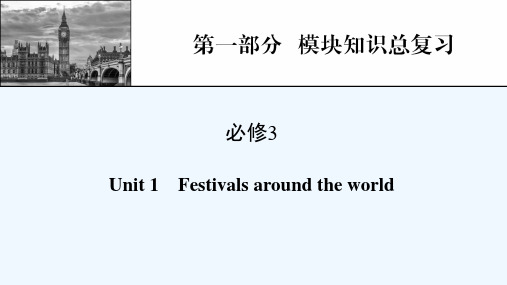
7.play a trick on
8.keep one’s word 常 用 9.hold one’s breath 短 10.dress up 语 11.in memory of
12.day and night
__搞__恶__作__剧__;__诈__骗__ __守__信__用__;__履__行__诺__言___ __屏__息__;__屏__气______ __盛__装__;__打__扮__;__装__饰___ __纪__念____________ __日__夜____________
用however改写句子: 精
Usually, even if we are very busy,we will try to come home for 雕
the celebration. 玉
Usually,__h_o_w_e_v_e_r_b_u_s_y__w_e_a_r_e__, we will try to come home 琢
• 【多维训练】 • ◆语法填空 • ② I’m writing this letter to express my apology ______ you ______ not writing you back in time. • ③You should make ________ apology to her for ________ (arrive) late.
needed!(It+be obvious that…)
单元要点突破
• 1.admire vt. 赞美;钦佩;羡慕 • 【考点激活】 • ①He observed that Homer __________________ after two thousand years. • 他观察到,两千年后荷马仍然被人赞赏。
Unit1Festivalsaroundtheworld(新课标版高一英语必修三教案教学设计)

Unit 1 Festivals around the world(新课标版高一英语必修三教案教学设计)Unit 1 Festivals around the worldThe First Period (Warming up & Pre-reading)Step One: Lead-inFree Talk: Did you have a good time in your winter holidays?When did you feel most happy and excited? Why?( At the Spring Festival. Because it's the most important festival in our country....)Step Two: Warming up1. Let the Ss think about the other Chinese festivals.( Lantern Festival, Pure Brightness Festival, Dragon Boat Festival, Mid-Autumn Festival, New Year's Day, Chung Yeung Festival....)2. Discussion One1)Let the Ss look at the information about Chinese festivals and discuss another four Chinese festivals according to the example in warming up: When does the festival come?What do people celebrate?What do people do?Festivals Date festivals DateNew Year January1st Teachers' Day September 10thInternational Women's Day March 8 National Day October 1stArbor Day March 12th The Spring Festival Lunar New Year International labor Day May 1st Dragon Boat Festival the fifth day of the fifth lunar monthInternational Children's Day June 1st Mid-Autumn Festivalthe 15th day of the 8th lunar monthArmy Day August 1st Lantern Festival the 15th day of the 1st lunar monthChinese Youth Day May 4th Pure Brightness Day April the fifth2) Let the Ss fill in the form in the warming up and ask some to share their opinions with the whole class.3 Discussion TwoTalk about some foreign festivals.( Christmas, April Fools Day, Easter Day, Halloween, Valentine's Day, Thanksgiving Day, Obon...)Step three: Pre-readingLet students think about the questions:1) What is your favourate holiday of the year? Why?2)What festivals or celebrations do you enjoy in your city or town? Do you like spending festivals with your family or with friends? What part of a festival do you like best- the music, the things to see, the visits or the food?Step Four: Language Points1.mean to do 打算做某事mean doing 意味着….I never meant him to work for us.Passing the entrance examination means being admitted into college.2. celebrate vt.(1) do sth to show that a day or an event is important 庆祝;祝贺celebrate Christmas / one’s birthday / a wedding anniversary / a victory(2) praise and honor 赞扬;称颂The names of many heroes are celebrated by the poets.词语辨析:celebrate, congratulatecelebrate后常接日期、事情或场合。
Part3-4 Unit1 Festival Around the World教案-【中职专用】高二
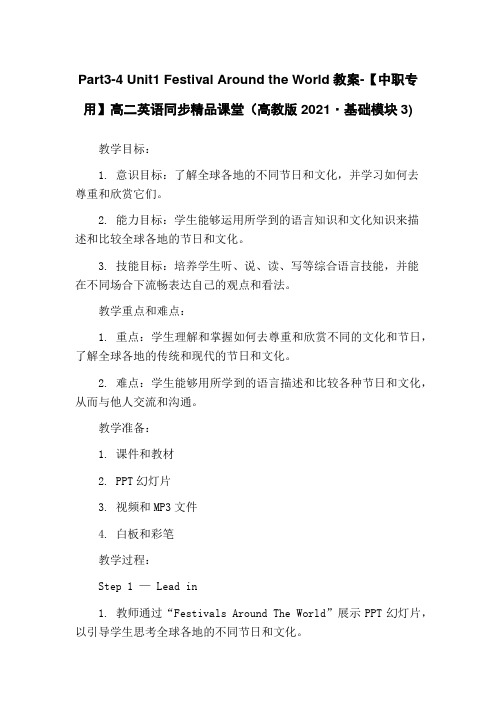
Part3-4 Unit1 Festival Around the World教案-【中职专用】高二英语同步精品课堂(高教版2021·基础模块3) 教学目标:1. 意识目标:了解全球各地的不同节日和文化,并学习如何去尊重和欣赏它们。
2. 能力目标:学生能够运用所学到的语言知识和文化知识来描述和比较全球各地的节日和文化。
3. 技能目标:培养学生听、说、读、写等综合语言技能,并能在不同场合下流畅表达自己的观点和看法。
教学重点和难点:1. 重点:学生理解和掌握如何去尊重和欣赏不同的文化和节日,了解全球各地的传统和现代的节日和文化。
2. 难点:学生能够用所学到的语言描述和比较各种节日和文化,从而与他人交流和沟通。
教学准备:1. 课件和教材2. PPT幻灯片3. 视频和MP3文件4. 白板和彩笔教学过程:Step 1 — Lead in1. 教师通过“Festivals Around The World”展示PPT幻灯片,以引导学生思考全球各地的不同节日和文化。
2. 打开视频,展示一些全球各地的节日和文化,帮助学生更好地了解各种节日的不同。
Step 2 — Reading1. 通过阅读教材的有关内容,让学生了解各种节日和文化,并了解其背后的故事。
2. 问和回答学生中英文句型,过程中引导学生讨论节日庆祝活动中的不同文化特色、重要活动和传统食物等问题,并介绍其中的一些英语单词和短语。
Step 3 — Practice1. 回忆并讲解Unit 1 Part 2中已学过的单词和语言知识,再进行一些单词和短语的拓展讲解,并阅读有关Unit1 Part 3中的新词汇和表达方式。
2. 通过与同学进行一些角色扮演、练习对话、讨论时事、介绍课外活动等练习,帮助学生熟悉这些新词汇和表达方式。
Step 4 — Writing1. 讲解如何写一篇有关全球节日和文化差异和各种节日的文章。
2. 引导学生找出文章中有用的词汇和短语,如“How to respect other cultures”和“celebrating cultural differences”,并解释其含义。
高考英语一轮基础达标练题 Unit 1 Festivals around the world(含解析

Unit 1 Festivals around the world李仕才一、阅读理解Friendship is one of the basic bonds between human beings. While the characteristics of friendship might vary from one country to another, people from all cultures not only enjoy friends but need them.Many studies have shown that teenagers who have no friends often suffer from psychological disorders. It has been shown that teenagers, perhaps more than any other age group, need companionship and a sense of belonging. The negative consequences of loneliness have also been observed among the elderly. The death of a spouse often leaves a widow or a widower totally bereft. If, however, they are surrounded by friends and relatives and if they are able to express their feelings, they are more likely to recover from their grief.“No man is an island.〞 In other words, we are all parts of society. We all need the love, admiration, respect and moral support of other people. If we are fortunate, our friends will provide us with all of these necessary aspects of life.As most people observe, there are many levels of friendship. The degree or intensity of friendship varies depending on the personality of the individuals involved and the context of the relationships. Outgoing persons enjoy being surrounded by many people whereas shy persons are perhaps content with fewer but more intense friendships.Everyone is not equally open with all their friends. The degree of closeness is determined by many factors. Close friends can be formed at any stage in one’s life but they are usually very rare. Not very many people have more than a few really close friends. Regardless of the level of closeness, all friendships are based on reciprocity (互惠), honesty and a certain amount of love and affection.1.Who are more likely to suffer from psychological disorders without friends?A.Teenagers.B.Adults.C.The elderly.D.A couple.2.What does the sentence “No man is an island〞 really mean?A.No man is willing to live on an island.B.Man usually doesn’t go to an islandC.Everyone is related with our society.D.Our society is just like an island.3.What can we learn about outgoing people?A.They like being alone.B.They are fond of making friends.C.They have intense friendships.D.They have fewer close friends indeed4.What does the last paragraph mainly talk about?A.The formation of close friends.B.The number of real friends.C.Honesty, love and affection.D.Factors to determine the degree of closeness.【文章大意】本文是一篇议论文。
新人教版 Book 3 Unit 1 Festivals around the world 课文

Unit 1 Festivals around the worldPart I Festival s and celebration sFestival s and celebration s of all kinds have been held everywhere since ancient times. Most ancient festivals would celebrate the end of the cold weather, plant ing in spring and harvest in autumn. Sometimes celebrations would be held after hunter s had caught animals. At that time people would starve if food was difficult to find, especially during the cold winter months. Today’s festivals have many origin s, some religious, some season al, and some for special people or event s. Festivals of the DeadSome festivals are held to honour the dead, or to satisfy the ancestor s, who might return either to help or to do harm. For the Japanese festival Obon, people should go to clean the grave s and light incense in memory of their ancestors. They also light lamp s and play music because they think that this will lead the ancestors back to earth. In Mexico people celebrate the Day of the Dead in early November. On this important feast day, people eat food in the shape of skulls and cakes with “bone s” on them. They offer food, flowers and gift s to the dead. The western holiday Halloween also had its origin in old belief s about the return of the spirit s of dead people. It is now a children’s festival, when they can dress up and go to their neighbours’ homes to ask for sweets. If the neighbours don’t give any sweets, the children might play a trick on them.Festivals to Honour PeopleFestivals can also be held to honour famous people. The Dragon Boat Festival in China honours the famous ancient poet, Qu Yuan. In the USA, Columbus Day is in memory of the arrival of Christopher Columbus in the New World. India has a national festival on October 2 to honour Mahatma Gandhi, the leader who helped gain India’s independence from Britain.Harvest FestivalsHarvest and Thanksgiving festivals can be very happy events. People are grateful because their food is gather ed for the winter and the agricultural work is over. In European countries, people will usually decorate church es and town hall s with flowers and fruit, and will get together to have meals. Some people might win award s for their farm produce, like the biggest watermelon or the most handsome rooster. China and Japan have mid-autumn festivals, when people admire the moon and in China, enjoy mooncakes.Spring FestivalsThe most energetic and important festivals are the ones that look forward to the end of winterand to the coming of spring. At the Spring Festival in China, people eat dumplings, fish and meat, and may give children lucky money in red paper. There are dragon dances and carnival s, and families celebrate the lunar New Year together. Some Western countries have very exciting carnivals, which take place forty days before Easter, usually in February. They might include parades, dancing in the streets day and night, loud music and colourful clothing of all kinds. Easter is an important religious and social festival for Christians around the world. It celebrates the return of Jesus from the dead and the coming of spring and new life. Japan’s Cherry Blossom Festival happens a little later. The country, covered with cherry tree flowers, looks as though it is covered with pink snow.People love to get together to eat, drink and have fun with each other. Festivals let us enjoy life, be proud of our custom s and forget our work for a little while.Part II a sad love storyLi Fang was heart-broken. It was Valentine’s Day and Hu Jin had said she would meet him at the coffee shop after work. But she didn’t turn up. She could be with her friends right now laughing at him. She said she would be there at seven o’clock, and he thought she would keep her word. He had looked forward to meeting her all day, and now he was alone with his roses and chocolates, like a fool. Well, he was not going to hold his breath for her to apologize. He would drown his sad ness in coffee.It was obvious that the manager of the coffee shop was waiting for Li Fang to leave —he wipe d the tables, then sat down and turned on the TV —just what Li Fang needed! A sad Chinese story about lost love.The granddaughter of the Goddess of Heaven visited the earth. Her name was Zhinu, the weaving girl. While she was on earth she met the herd boy Niulang and they fell in love. (“Just like me and Hu Jin,” thought Li Fang.) They got married secretly, and they were very happy. (“We could be like that, ” thought Li Fang.) When the Goddess of Heaven knew that her granddaughter was married to a human, she became very angry and made the weaving girl return to Heaven. Niulang tried to follow her, but the river of stars, the Milky Way, stop ped him. Finding that Zhinu was heart-broken, her grandmother finally decided to let the couple cross the Milky Way to meet once a year. Magpies make a bridge of their wing s so the couple can cross the river to meet on the seventh lunar month. People in China hope that the weather will be fine on that day, because if it is raining, it mean s that Zhinu is weep ing and the couple won’t be able to meet.The announcer said, “This is the story of Qiqiao Festival. When foreigner s hear about the story, they call it a Chinese Valentine’s story. It’s a fine day today, so I hope you can all meet the one you love.’’As Li Fang set off for home, he thought, “I guess Hu Jin doesn’t love me. I’ll just throw these flowers and chocolates away. I don’t want them to remind me of her.’’ So he did.As he sadly pass ed the tea shop on the corner on his way home, he heard a voice calling him. There was Hu Jin waving at him and calling, “Why are you so late? I’ve been waiting for you for a long time! And I have a gift for you!”What would he do? He had thrown away her Valentine gifts! She would never forgive him. This would not be a happy Valentine’s Day!.。
人教版高中英语必修三 Unit1 PPT课件 图文
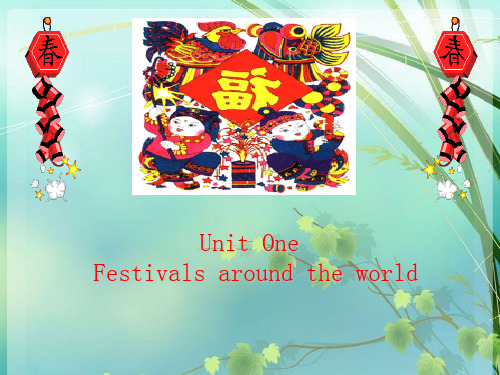
Some western festivals:
Thanksgiving Day Easter (复活节) Carnival(狂欢节)
• Period 5 • Main tasks: • 1. Tb. page 7 Reading and writing “A sad love
story”. • Read through the whole story and finish Ex1.
Period 6
• Main task: • 1. Page 42: Using words and expressions. • 2. Tb. Page 43. Using structures. Keys on next page.
Spring Festival, Easter, China, some western Cherry Blossom Festival countries, Japan
Period 2
• Main tasks: • 1. Check vocabulary. • 2. Check Comprehending-2. • 3. Selfstudy <>words, phrases & sentenses. • 4. Show the Key Points. • 5. Time for memory.
有意栽花花不开,无心插柳柳成荫./阴差阳错.
Period 5
• Check:<> Section 1 points. • 1. 我饿了;饿死;渴望得到; • 2. 不劳无获。 • 3. 她得到了1000美元的奖金。
授予某人某物; 他作为最佳歌手被授予一等奖。 4. 我钦佩他的诚实。 5. 他精力充沛。 6. 要习惯另一个国家的风俗是很困难的。 7. 在过去的几年中我的家乡发生了巨变。 8. 我送你这张卡片以纪念我们在一起的快乐夏天。 9. 装扮成… 10.我并非要伤害你。 11. 赶不上这个航班意味着要再等三个小时. 12. 我认为获得邀请是无上的光荣./ 被邀请在这次会议上讲话,我 感到很荣幸.
festivals around the world(世界上的各个文化)

Practice makes perfect. 熟能生巧
Summary
There are many kinds of festivals all around the world.The first one,festivals of the _________.For example,the Japanese Dead light festival Obon.People should go to clean graves and __________ incense in _________ memory of their ancestor.The western holiday Halloween , now it ’ s a children ’ s festival , when they can _______ dress up and ask for sweets.If people don't give any sweets, the children might play a _______ trick on them. The second one , festivals to ___________ people.For honor example,the Dragon Boat Festival.
Six. (Obon、Day of the dead、Halloween、the Dragon Boat Festival、Columbus Day、National Festival.)
Intensive Reading
Fill in the following chart
Kinds of festivals Names of festivals
in memory of
最新-重庆市綦江实验中学校高中英语必修三:unit 1 festivals around the w
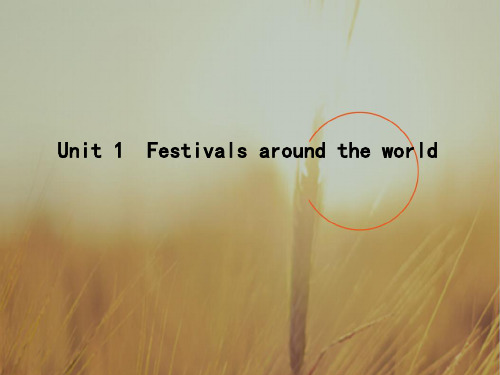
.
A.Chinese B.Japanese
C.Christians D.Americans
答案:1.C 2.B 3.C
课堂讲练 Warming Up 1.Discuss when they take place,what they celebrate and what people do at that time. 讨论它们(中国节日)在什么时间举行,庆祝的是什么事件,人们在那天做 什么事。(P1) ◆ take place 发生 In 2022 the Winter Olympic Games will take place in Beijing and Zhangjiakou. 在2022年,冬奥会将在北京和张家口举行。 The idea comes from a small incident that took place last month. 这个想法来自上个月发生的一件小事。
take the place of代替 归纳拓展 take one’s place 入座;替代某人
in place of sb.=in one’s placee,happen,break out,occur,come about ①take place 发生、举行、举办。一般指非偶然性事件的“发生”,即这种事件的发生一定有某
to sb./It occurs/occurred to sb.that...“某人突然想起……” ⑤come about表示“发生、产生”,多指事情已经发生了,但还不知道为什么,常用于疑问句和否
定句。 Great changes have taken place in that area in the past ten years.在过去的十年中 那个地区发生了巨大的变化。 The accident happened at 7:50 am on Jiqing Highway. 上午七点五十分,事故发生在济青高速公路上。 He was born just four months before the war broke out. 他在战争爆发前四个月出生。 It occurred to me that she must have known the news. 我突然想到,她一定是知道了那个消息。 They didn’t know how the change had come about. 他们不知道这个变化是怎样产生的。
Unit1festival around the world 课后翻译
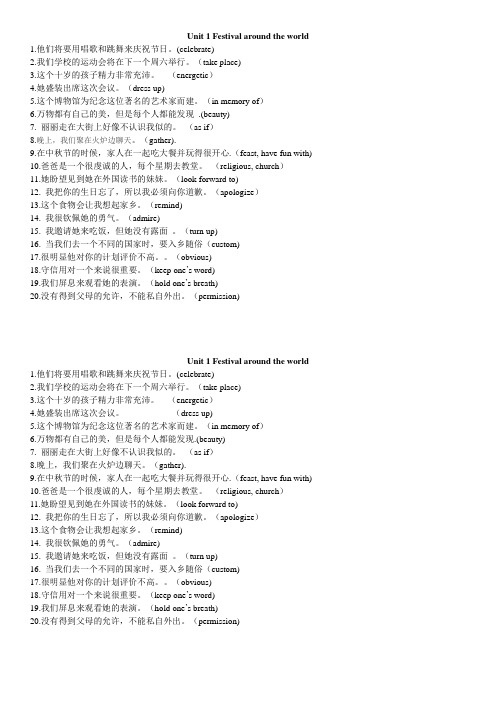
Unit 1 Festival around the world1.他们将要用唱歌和跳舞来庆祝节日。
(celebrate)2.我们学校的运动会将在下一个周六举行。
(take place)3.这个十岁的孩子精力非常充沛。
(energetic)4.她盛装出席这次会议。
(dress up)5.这个博物馆为纪念这位著名的艺术家而建。
(in memory of)6.万物都有自己的美,但是每个人都能发现.(beauty)7. 丽丽走在大街上好像不认识我似的。
(as if)8.晚上,我们聚在火炉边聊天。
(gather).9.在中秋节的时候,家人在一起吃大餐并玩得很开心.(feast, have fun with)10.爸爸是一个很虔诚的人,每个星期去教堂。
(religious, church)11.她盼望见到她在外国读书的妹妹。
(look forward to)12. 我把你的生日忘了,所以我必须向你道歉。
(apologize)13.这个食物会让我想起家乡。
(remind)14. 我很钦佩她的勇气。
(admire)15. 我邀请她来吃饭,但她没有露面。
(turn up)16. 当我们去一个不同的国家时,要入乡随俗(custom)17.很明显他对你的计划评价不高。
(obvious)18.守信用对一个来说很重要。
(keep one’s word)19.我们屏息来观看她的表演。
(hold one’s breath)20.没有得到父母的允许,不能私自外出。
(permission)Unit 1 Festival around the world1.他们将要用唱歌和跳舞来庆祝节日。
(celebrate)2.我们学校的运动会将在下一个周六举行。
(take place)3.这个十岁的孩子精力非常充沛。
(energetic)4.她盛装出席这次会议。
(dress up)5.这个博物馆为纪念这位著名的艺术家而建。
(in memory of)6.万物都有自己的美,但是每个人都能发现.(beauty)7. 丽丽走在大街上好像不认识我似的。
- 1、下载文档前请自行甄别文档内容的完整性,平台不提供额外的编辑、内容补充、找答案等附加服务。
- 2、"仅部分预览"的文档,不可在线预览部分如存在完整性等问题,可反馈申请退款(可完整预览的文档不适用该条件!)。
- 3、如文档侵犯您的权益,请联系客服反馈,我们会尽快为您处理(人工客服工作时间:9:00-18:30)。
Unit OneFestivals around the world1.plenty n.充足;大量;富裕plenty of + [UC] 大量的days of plenty 富裕的日子2.ancestor n.祖先;祖宗3.harm n. 伤害do harm to sbbe harmful to sbcome to no harm 没有受到伤害do more harm than goodmp light lamps 点灯lamb 羔羊5.feast n.盛宴;庆典on this important feast day 在这重要的节庆日子里6.cakes with bones on them 骨头形的蛋糕cakes in the shape of bones7.origin n. 起源;由来;起因sth has its origin 起源;由来originate from/in 起源于…8.trick n. 诡计;恶作剧play a trick on sb 作弄某人play a joke on sb 开某人的玩笑10.poet n. 诗人a famous ancient poet11.arrival n. arrive v. 到达the arrival of Christopher Columbus12.fool n.傻子v.愚弄某人fool sbadj.愚蠢的13.independence n. 独立;自主independent adj.gain one’s independence14.European adj.欧洲的n.欧洲人Europe n.欧洲European countries15.custom [c] n. 风俗It is a custom for sb to do sth16.award n.奖;奖品win an award 获奖v.授予award sth to sbaward sb sth17.watermelon n. 西瓜18.rooster n. 公鸡a handsome rooster19.Easter 复活节20.clothing 衣服总称colourful clothing of all kinds各种鲜艳的盛装21.Christian n.基督徒; adj.基督教的a Christian 一名基督教徒Christian countries 信基督教的国家22.daily adj.每日的;日常的adv.每日n.日报our daily life 我们的日常生活write to sb daily = write to sb every day 每天写信给某人China daily 中国日报23.permission n. 允许permit v.ask for permission 请求允许24.possibility n.可能性;可能发生的事possible adj.It is possible for sb to do sth25.sadness n. sad adj.26.couple n. 一对,一双后跟单数或复数a couple of days = a few days27.weep n.哭;哭泣vi. 哭泣;流泪weep wept wept 无声流泪cry cried cried 放声哭28.announcer n.播音员announce vt. 宣布;公告announcement n. 宣告; 告示29.starve v. 饿死starve sb to death 饿死某人starve for sth 渴望得到某物die of starvation 死于饥饿starvation wages不够维持基本生活的工资30.lead to 通往;导致= result inlead to doing sth 导致做某事31.gain v.获得;得到gain one’s independence 赢得独立gain a decisive victory 赢得决定性的胜利32.gather v.&n. 集合;聚集;采集gather/collect flowers 采花Dark clouds are gathering. 乌云密布33.admire vt.赞美;钦佩;羡慕admire the moon 赏月admire sb for sth 因为…而钦佩(羡慕)某人despise sb 轻视某人34.apologise vi.道歉;辩白apologise to sb for sth 因某事而向某人道歉make an apology to sb for sth35.drown v.溺死;淹死;淹没The flood drowned the streets and houses.drown one’s sorrow/sadness in sth 借…消愁a drowning man 一个溺水的人 a drowned man 一个淹死的人drown himself in work 沉溺(埋头)于工作36.wipe vt. 擦, 揩, 擦去wipe the table 擦桌子wipe off the dirt 擦去灰尘37.forgive forgave forgiven 原谅;饶恕forgive sb for sth 因……而原谅某人ask for forgiveness 请求宽恕38.national adj. 国家的;民族的a national holiday 一个全国性的节日39.agricultural adj.农业的agriculture n. 农业a season of agricultural work 农活季节40.handsome adj. 英俊的;大方的a handsome young man41.energetic adj.精力充沛的energy n. 精力;能量42.religious adj. 宗教的religion n.宗教43. social adj.社会的;社交的a religious and social festival44.obvious adj. 显而易见的It is obvious that… 显然45.lovely adj. 可爱的;有趣的the most lovely of the daughters46.forward adj. adv.the forward section of the airplane飞机的前部look forward to sth/doing sth47.take place vi 发生happen; 举行be held48.in memory of = in honour of 为了纪念in praise of 为了赞扬in celebration of 为了庆祝in search of 为了搜寻49.dress sb up 打扮某人dress up in…dress sb.in… 给…穿…衣服be dressed in 穿着…衣服= be wearinga dress 一件连衣裙an evening dress 一件晚礼服50.play a trick on sb 作弄某人play a joke on sb 开某人的玩笑51.look forward to sth / doing sth to是介词的短语有be/get used topay attention tostick tolead to52.day and night = night and day53.as though = as if 似乎;好像She looked as if she were made of ice.She spoke to me as if she had known me.54.have fun with sb. 玩得开心=have a good time with sb55.turn up 出现;露面,调大(高)So far he hasn’t turned up.turn the radio / tap up56.keep one’s word/promise 守信用;守诺言a man of his word 一个说话算数的人have a word with sb 和某人说句话in a word 总之in other words 换句话说57.hold/catch one’s breath 屏住呼吸take a deep breath 深吸一口气out of breath 上气不接下气58.satisfy sb be satisfied with sb satisfying = satisfactory adj.功能1.提出请求(Request)Would/Could you please…?May I see…?Would you like…?You should try…Could I have…?Could we look at…?Might I suggest…?We might take…2.表示感谢及应答(Thanks and response)It’s very kind of you to…You’re the most welcome.I look forward to…Don’t mention it.Thank you very much.Thanks a lot.I’d love to. It was a pleasure to…语法情态动词:can/could; may/might; will/would; shall/should; must/can’t; need。
